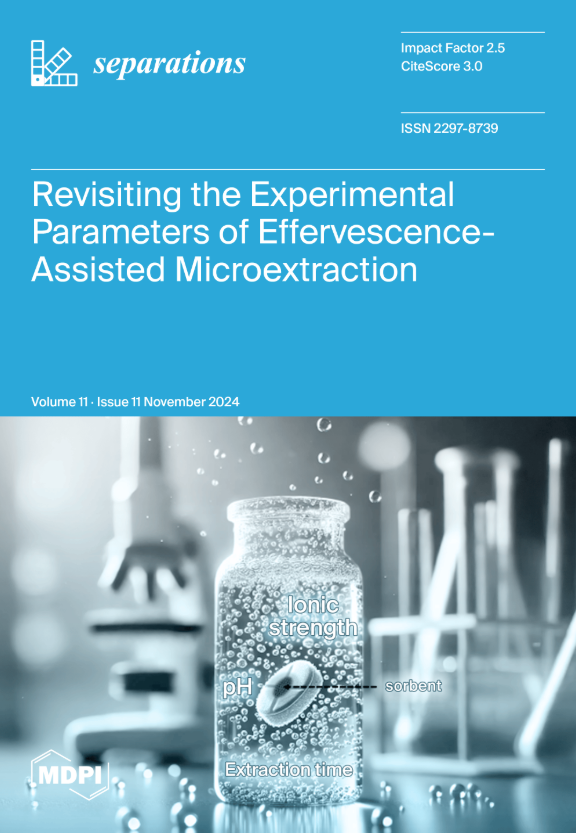通过模拟离心分离色谱法中的流体力学预测渗漏情况
IF 2.7
4区 工程技术
Q3 CHEMISTRY, ANALYTICAL
引用次数: 0
摘要
离心分离色谱法(CPC)利用两相液液系统作为流动相和固定相。在运行过程中,尽管流动相实际上是固定的,但后者会不断地从转子中排出,从而导致分离效率随着时间的推移而降低,由于无论是模拟还是广泛的实验研究都没有涉及到这种所谓的渗流现象,因此人们对这一现象的了解至今仍然很有限。本研究提出的模型详细讨论了基本流体力学。该模型可模拟 60 秒内的渗流,并通过实验验证了利用水相-有机相系统的离心分离色谱仪的不同工作点(容积流速分别为 5、12 和 20 mL-min-1)。我们在转子入口处模拟了两个相互连接的腔室,并分析了固定相随时间的流失情况。模拟第二室的结果与实验验证结果非常吻合。因此,利用流体力学模拟预测出血是成功的。此外,我们还强调了本研究中模拟的双室设置与单室模型相比的优势。本文章由计算机程序翻译,如有差异,请以英文原文为准。
Prediction of Bleeding via Simulation of Hydrodynamics in Centrifugal Partition Chromatography
Centrifugal Partition Chromatography (CPC) utilizes a two-phase liquid–liquid system as mobile and stationary phases. During operation, the latter continuously drains out of the rotor, despite it being in fact stationary, leading to decreasing separation efficiency over time, a phenomenon still poorly understood today because neither simulations nor extensive experimental investigations have addressed this so-called bleeding. With the model presented in this study, the underlying hydrodynamics are discussed in detail. This model can simulate bleeding over 60 s and is verified experimentally for different operating points (volumetric flow rates of 5, 12, and 20 mL⋅min−1) of the Centrifugal Partition Chromatograph utilizing an aqueous–organic phase system. We simulated two interconnected chambers at the rotor inlet and analyzed the loss of the stationary phase over time. The results of the simulated second chamber are closely aligned with the experimental validation results. Thus, the prediction of bleeding utilizing the simulation of hydrodynamics was successful. Moreover, we highlighted the benefits of the two-chamber setup modeled in this study compared to single-chamber models.
求助全文
通过发布文献求助,成功后即可免费获取论文全文。
去求助
来源期刊

Separations
Chemistry-Analytical Chemistry
CiteScore
3.00
自引率
15.40%
发文量
342
审稿时长
12 weeks
期刊介绍:
Separations (formerly Chromatography, ISSN 2227-9075, CODEN: CHROBV) provides an advanced forum for separation and purification science and technology in all areas of chemical, biological and physical science. It publishes reviews, regular research papers and communications. Our aim is to encourage scientists to publish their experimental and theoretical results in as much detail as possible. There is no restriction on the length of the papers. The full experimental details must be provided so that the results can be reproduced. There are, in addition, unique features of this journal:
Manuscripts regarding research proposals and research ideas will be particularly welcomed.
Electronic files and software regarding the full details of the calculation and experimental procedure, if unable to be published in a normal way, can be deposited as supplementary material.
Manuscripts concerning summaries and surveys on research cooperation and projects (that are funded by national governments) to give information for a broad field of users.
The scope of the journal includes but is not limited to:
Theory and methodology (theory of separation methods, sample preparation, instrumental and column developments, new separation methodologies, etc.)
Equipment and techniques, novel hyphenated analytical solutions (significantly extended by their combination with spectroscopic methods and in particular, mass spectrometry)
Novel analysis approaches and applications to solve analytical challenges which utilize chromatographic separations as a key step in the overall solution
Computational modelling of separations for the purpose of fundamental understanding and/or chromatographic optimization
 求助内容:
求助内容: 应助结果提醒方式:
应助结果提醒方式:


